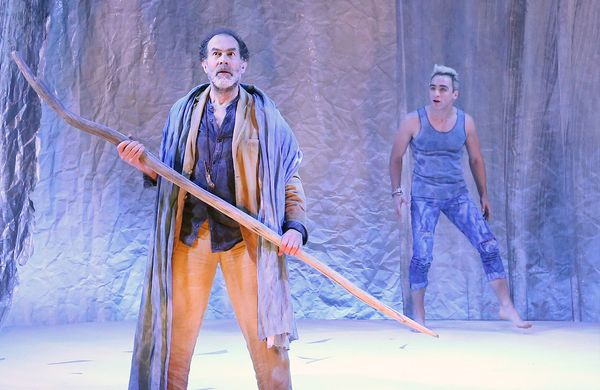
Support
Supporter Spotlight: Matthew, Anne and Margaret Paliaga
28 Feb 2022
The hardships of the pandemic have reminded everyone how precious happiness and wellbeing are. So, in the run-up to the UN International Day of Happiness on 20 March, we asked an expert panel to name their favourite moments of happiness and celebration in Shakespeare. Today we reveal three scenes that are guaranteed to put a smile on your dial.
Compiled by Andy McLean
Join the debate
Which moment in Shakespeare raises your spirits? Do you agree or disagree with the experts’ selections? Share your view on Twitter, Facebook, Instagram or LinkedIn.
7. Sebastian and Viola are reunited
Twelfth Night follows the (mis)fortunes of identical twins Sebastian and Viola, who each assume that the other has died during a violent storm and shipwreck. Shakespeare himself knew how devastating such a loss could be (he was the father of twins, one of whom died in childhood). And at the end of Twelfth Night, the playwright gave Sebastian and Viola the joyous reunion that his own children could never have.
For Joanna Erskine, Bell Shakespeare’s Head of Education, this moment of happiness is her favourite: “There are so many reunions in the comedies but this one is particularly beautiful because it’s so pure and innocent and really underplayed. After all the chaos that has gone before, the characters come together on stage – with Viola dressed as a boy and Sebastian there too – and everyone realises what is happening before they do!
“Then the twins have this moment where they turn to one another and Sebastian says, ‘Do I stand there? I never had a brother; / … I had a sister, / Whom the blind waves and surges have devoured.’ The way Shakespeare handles this is so lovely; they don’t just descend into squeals of delight. Viola says: ‘My father had a mole upon his brow,’ and Sebastian replies, ‘And so had mine’. The perfection of that heartfelt moment is so much better than just going over the top.”
6. Prospero grants freedom to Ariel
Although Ariel has the ability to fly, conjure illusions, and become invisible, the poor sprite remains the captive of the sorcerer, Prospero, through almost all of The Tempest. While Ariel does his master’s bidding, he longs to be set free.
Prospero does not relent until the finale of the play and, when he eventually does, the sense of release is palpable for all the characters. Not only does Ariel secure his own freedom, but he also convinces Prospero to take pity on his enemies and forgive them. Prospero heeds Ariel’s words and releases his grip on everyone else. In doing so, he sets himself free of all the anger and hatred that has consumed him.
Perhaps fittingly for a sensitive soul like Ariel, his moment of freedom is not a riotous moment of joy. He makes a tentative, heart-wrenching departure from the master he has served for so many years. And this moment of quiet happiness feels all the more genuine as a result.

Andrea Demetriades and Adam Booth in Twelfth Night (2010)

5. Hamlet (finally) confirms his suspicions
Shakespeare had a knack for lacing moments of joy with danger or heartbreak. In Much Ado About Nothing, Beatrice and Benedick declare their love for one another and in the next breath Beatrice asks Benedick to kill one of his friends. At the end of Twelfth Night, when multiple young lovers seal the deal with a kiss, an embittered Malvolio swears revenge on them all. And in Hamlet, when the Danish prince gets what he wants more than anything in the world – proof of Claudius’ guilt – it sparks a hellish chain of events that leads to Hamlet (and many other characters) meeting a sticky end.
Hamlet’s fleeting moment of vindication is author and teacher Brendan P Kelso’s pick for happiest moment in Shakespeare: “It may be a little dark, but when Hamlet discovers for certain that Claudius did what he did, it gives the prince some form of closure for what has been tormenting him,” explains Kelso. So, while it may not be “happy” in the traditional sense of the word, this bittersweet moment is classic Shakespeare. Nothing is ever quite as it seems.
To be continued…
Stay tuned on social media in the coming days as we share more reasons to smile in Shakespeare. Follow us on Twitter, Facebook, Instagram and LinkedIn.
Keep in touch
Sign up to a range of Bell Shakespeare enewsletters